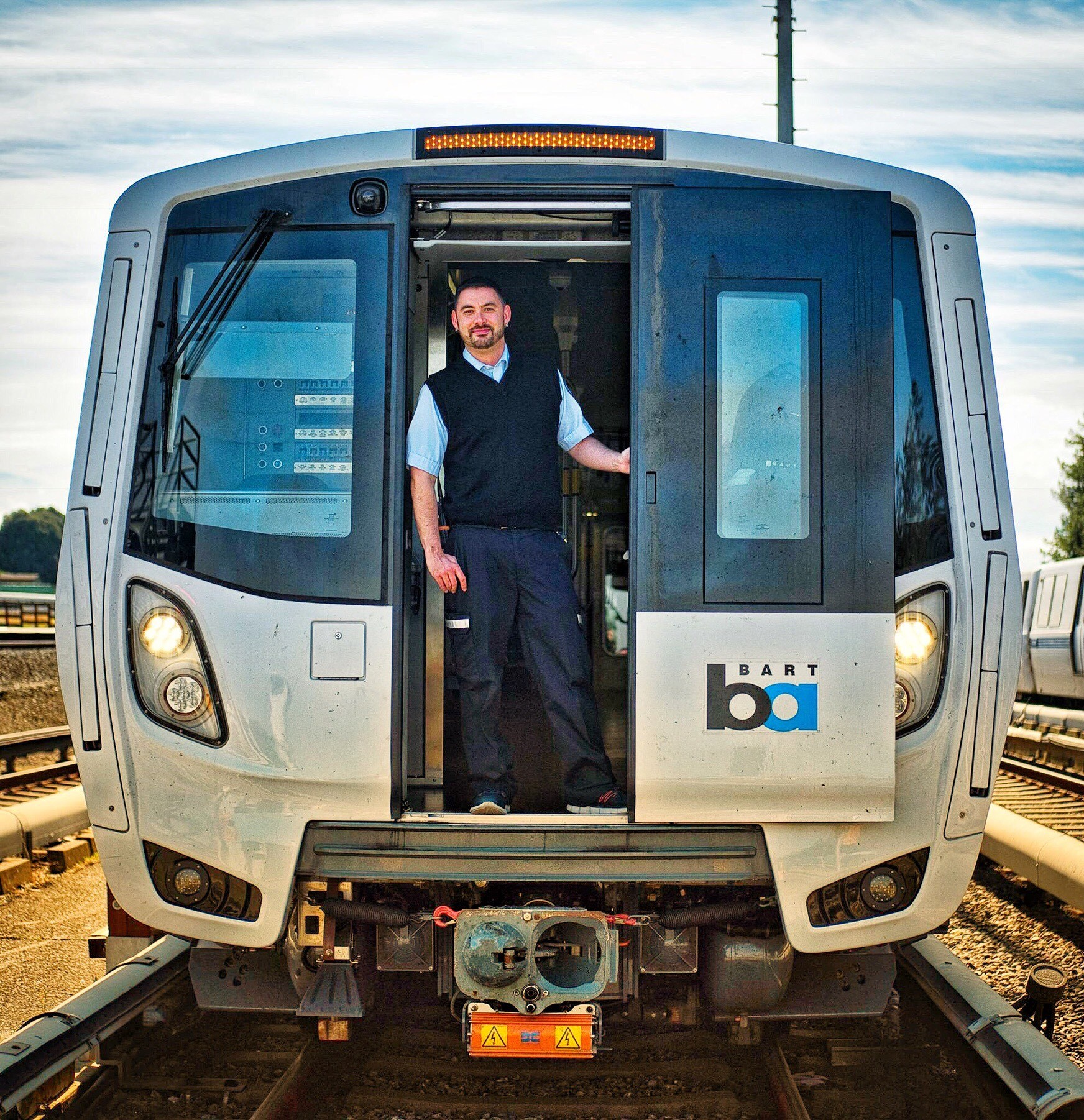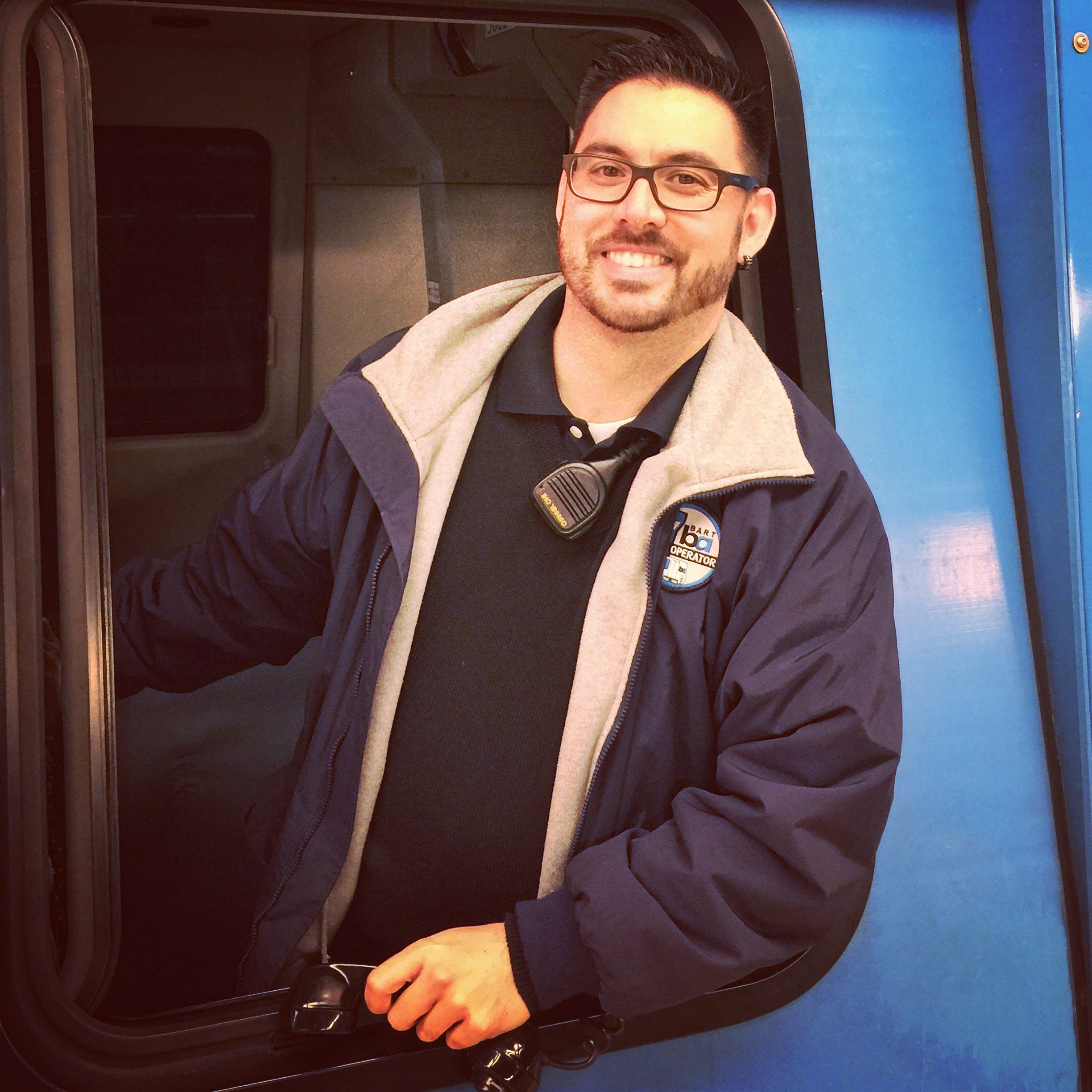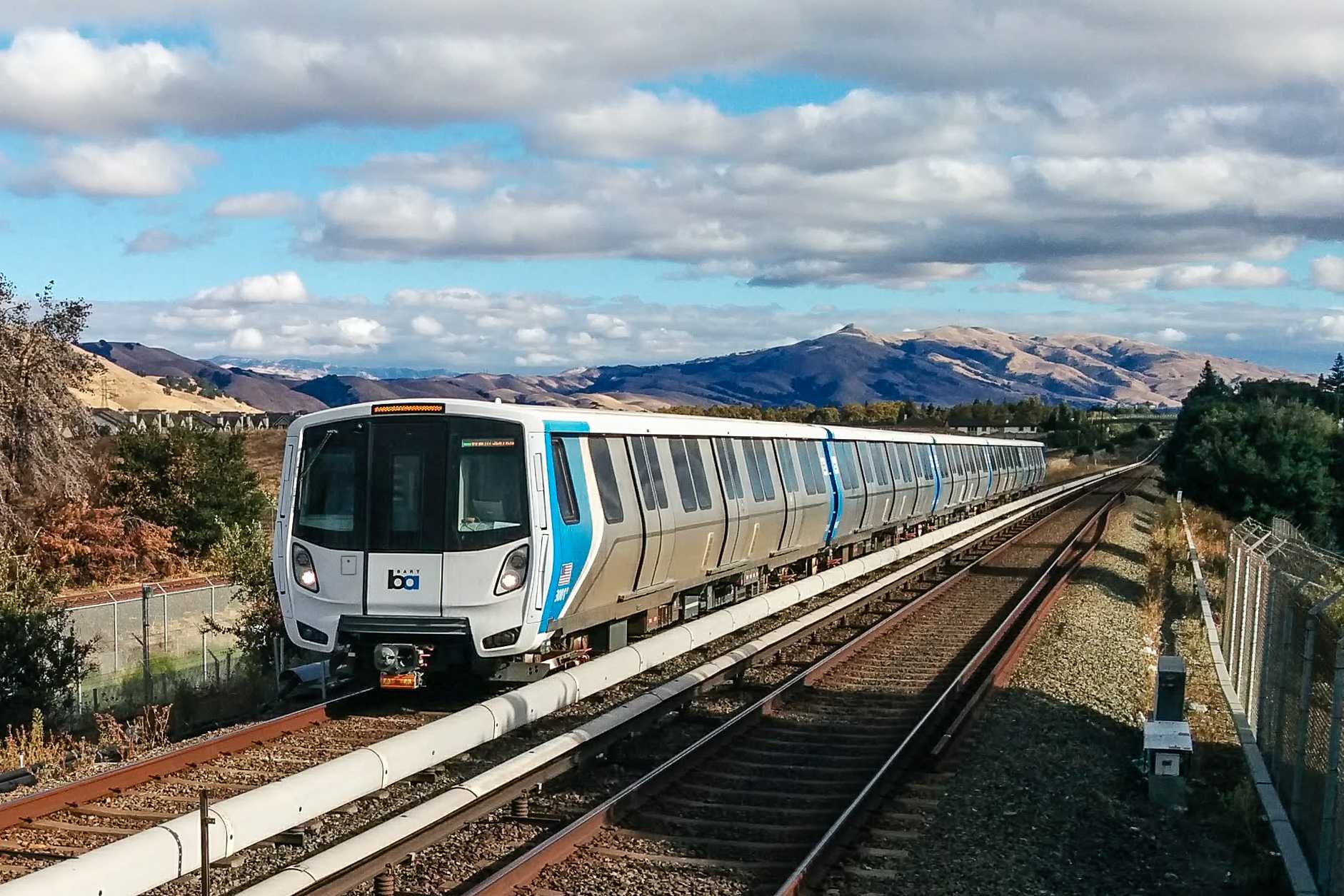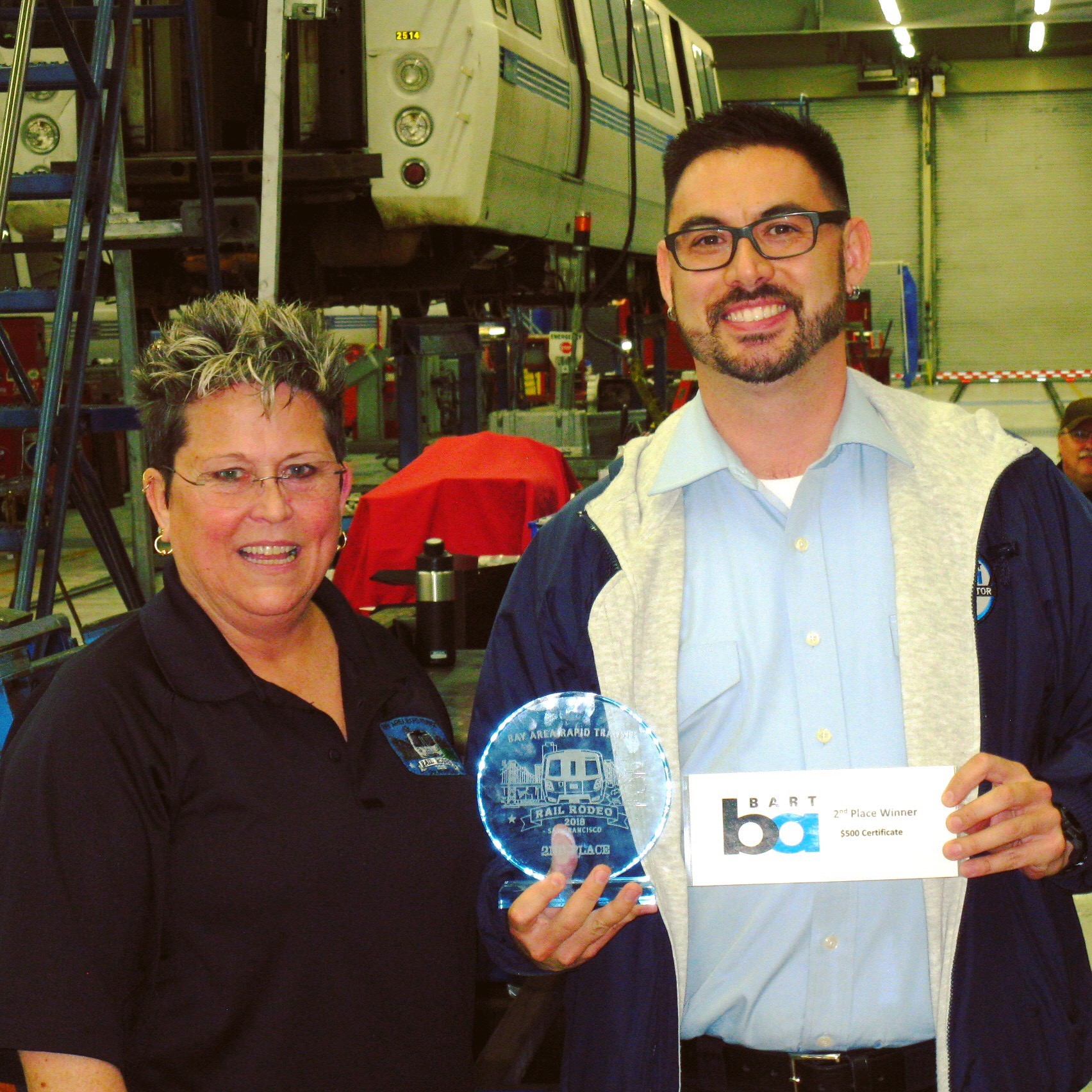Podcast: Training ramps up to fuel Fleet of the Future expansion

More BART riders than ever before can now ride the Fleet of the Future through the Transbay Tube. By mid-February, every transbay line will be served by a Fleet of the Future train. As more new cars arrive, BART is expanding its hands-on training for the operators who will run the new fleet.
On the latest edition of our podcast series, “Hidden Tracks: Stories from BART” we’ll learn more about the preparation that goes into being a Fleet of the Future Train Operator. We’ll hear from one of the first graduates of the training program and learn what it’s like to operate one of BART’s newest trains.
Transcript below:
HOST: “And I’m now speaking with Joe Benton who’s a Train Operator here at BART and Joe, I know you’re really involved with the Fleet of the Future. But before we get into that, thanks for joining us on the podcast.”
BENTON: “Oh absolutely, it’s good to be here.”
HOST: “There’s so much excitement about the Fleet of the Future and we talk about it a lot from the perspective of the riders because the trains look so great and we get so much positive feedback from our customers. But this is a big adjustment for the train operators. I just have to start out by asking you Joe, how did you become one of the train operators who really was among that first group to get trained up on how to operate all these new cars?”
BENTON: “Funny enough I actually got trained pretty quickly. When the training actually started to happen, I finished the first three phases in about six months, I’d say. So, I was one of the first ones to finish the entirety of the program. When I finished the training, I definitely wanted to actually get onto the cars as fast as possible so when I actually got the opportunity I pretty much jumped at it. I remember sitting at home and getting the phone call from my boss saying, ‘Joe, we’d really like to have you on the fleet’ and my first answer was, ‘absolutely, when do I start.”
HOST: “It is a pretty thorough process you go through because let’s face it, operating these news cars is nothing like the legacy fleet.”
BENTON: “Very true. It’s very, very different. You want to kind of compare, if you think about cellphones these days, it’s like an 80s cellphone compared to what we have today like an Apple or an Android.”
HOST: “Talk about that difference. It must be a lot to take in. You have years of experience on these older cars, how big of a difference is it and what does it practically mean for you as an operator?”

BENTON: “Well, if you think about the difference between both of the cars. The original cars are very mechanically based, lots of lights, lots of very simple indications with troubleshooting or things that are going wrong with the car or things that are just happening in general compared with the new cars where everything is software based. We have screens right in front of us that basically show us exactly what’s going on with the entirety of the train. Problems that are going on with each and every car. That’s probably the biggest difference is hardware compared to completely software based.”
HOST: “There’s always, I’ve found, on a very regular basis when someone sees a Fleet of the Future train pull into their station there’s a wow factor with that. They weren’t expecting that, it looks completely new, different, exciting. Is there that kind of wow factor for you as an operator?”
BENTON: “I’d say yes, for sure. It’s always exciting to come to work now just because it’s something new, it’s something brand new. It’s exciting, it’s just so different now. It’s like a big new toy.”
HOST: “Take us inside. Once you come in, you’re getting set in the cab to go on your shift. What is that like? What does it look like in there compared with the older cars?”
BENTON: “The cab is definitely a lot bigger, there’s a lot more room in there. We have a lot more screens to play with, a lot more procedure that we now have to now follow through with. Starting up, we’re making sure that our screens are working properly, we’re making sure that the communications system is working properly, ensuring that all of our screens are up, ensuring our destination signs are working properly, making sure that the announcements are playing correctly, and then checking every subsystem. There’s a lot more involved now, the whole start up takes a little bit longer. It’s like booting up a computer. Computer programs take their time to actually start up and go through their procedures. I would say that’s what it’s like sitting down when you first come and first sit down in a car compared with the old cars where it’s about five different steps and then you’re done.”
HOST: “I’m speaking with Joe Benton, a Train Operator here at BART. He’s been with BART for about 10 years. We’ve heard a lot about the sophistication of the new cars. They have about 180 software packages, which just blows my mind. How does that come into play when it comes to operating the new trains?”
BENTON: “A lot of the software stuff is background. So, a lot of it we actually don’t see, which is probably good thing when it comes to transitioning from the old cars to the new cars. But the fact that we know that the software packages are there, we know everything is being run in a very different capacity.”
HOST: “I think there are so many different features that even for the passengers on their normal experience they may not even be aware of, especially from a safety perspective. When it comes to the intercom, if someone pushes that button to talk to the train operator that’s a bit different than what happens with the older cars.”
BENTON: “Very much so. On the older cars we just hear them but with the new cars we actually can see them when they’re speaking to us and we can actually see what’s happening around them. That gives us the advantage and gives the passenger a new advantage too. They’re a lot safer and we know exactly what’s going on so if something is going on that shouldn’t be we can actually report it properly.”
HOST: “I know one of the mechanical challenges with the older cars is if there’s a problem it can be kind of hard to identify specifically where that problem is. But it sounds like with the newer cars, they’re so sophisticated we could actually identify a problem pretty quickly and know pretty much where it is on a train.”
BENTON: “Absolutely. The old cars, the indication is basically a light compared with the new cars where it actually shows you what car is having the problem and exactly what the problem is and exactly what the solution is. Having that difference and having all that information right at our fingertips is extremely beneficial for the train operator, the technicians who are on board trying to find the problem compared to having to pretty much guess with the old fleet.”
HOST: “Talk a little bit more about upgrades and improvements. What are some of the changes, some of the features that the new cars have that you’re most excited about?”
BENTON: “One of the biggest things that passengers notice is the extra door. The fact that we have three doors, it makes for better boarding, it makes for better selection to figure out where you want to actually be in the car. Then I would say the communications system as well. We have all of the automated announcements now. They’re loud and very, very clear. The interactive maps, which basically show you exactly where you’re at, so that’s something that really helps as well as a lot of other ADA features that we have. One of the other ones that is actually a really good feature that right in the center of the car is a zone specifically set for hearing impaired. So, they can actually hear the announcements a lot better with their own aids, basically.”
HOST: “That’s the hearing loop, right?”
BENTON: “Yes, yes, it is.”
HOST: “Getting back to safety, is there a way, all of the cars in our fleet be they Fleet of the Future, be they legacy fleet all have working surveillance cameras. As a train operator, is there any difference between the cameras in terms of what you’re able to access on a Fleet of the Future train.”
BENTON: “The only thing we can actually see is when a passenger calls. So, if a passenger calls with an intercom call and something that’s going on the cameras activate that are closest to the passenger actually calling. There are six cameras in each car compared to the four that are in the legacy fleet. There’s more security now and we’re actually able to see what’s going on a lot better compared to before when we actually can’t see what’s happening.”

HOST: “Is there a difference in the ride. Just the quality of the ride between the new cars and the old cars?”
BENTON: “The cars are definitely a bit quieter. It’s definitely a smoother ride. The passengers have a very good experience and the train operators we definitely have a better experience now riding on the new cars.”
HOST: “When you’re out there, you must enjoy the smiles and the wows because I see them I’m sure you do on a regular basis when you’re in the new cars.”
BENTON: “Oh absolutely, about once or twice a day we get one or two passengers that will come up and compliment and say, ‘thank you very much, good job you guys, this is a great improvement, love these new cars.’ It’s a constant thing now.”
HOST: “We talked about your training earlier. I just have to imagine that’s so challenging, you’re so used to a specific set of steps that you take to get a car ready to go, to get your train ready to go and it seems to me this is a whole difference process for you to learn after you have ten years of muscle memory. Has that been a challenge for you?”
BENTON: “It was a challenge in the beginning. I’d say that now with the new muscle memory I’m kind of actually forgetting stuff with the old muscle memory now, which I don’t think is necessarily a bad thing. It’s kind of like riding a bike. If I were to go to the old cars I’d remember probably within ten minutes but definitely the transition between the old cars and the new procedures it takes a little time to get used to but it’s not super intimidating.
HOST: “Is it almost easier for you. You mentioned you are kind of used to the new system. With all of that sophistication it sounds complex but once you really learn about these systems does it almost make your job a little easier?”
BENTON: “It actually does. I am noticing personally as a train operator on the new cars is my muscle memory is actually getting a lot faster with knowing exactly where things are at on the screens and what I’m supposed to push, what I’m not supposed to push, what activates what, what does what. So, I’d have to say things are actually improving with regards to my experience now actually operating these new cars and knowing exactly what I’m doing.”
HOST: “The new cars have the automatic train announcements too. How does that impact you?”
BENTON: “I don’t have to make as many announcements anymore, which is actually kind of nice, but I do miss it.”
HOST: “It really is a whole different experience in the sense that you’re just used to a certain routine during the day but in the new fleet it almost changes up in so many ways and that’s just one example.”
BENTON: “That’s one of them. We still have to make our transfer announcements. It’s nice, we still have the human factor involved, which is good. The thing is, sometimes the system may not work properly so we have to intervene and we have to make the announcements but I think it’s something that’s very beneficial for the passengers just being the fact that it’s clear, people can actually hear them properly now and eventually as time goes on they’ll start talking more and saying more information to passengers as we continue the upgrades.”
HOST: “One of the things we do on our podcast series Hidden Tracks is we demystify BART. We go behind the scenes, we look at how things really work. Give me an example, if you could, of something, a feature or what have you about the Fleet of the Future that our normal riders, even those that have been on the new train cars don’t really know about that you think is cool and is something that’s worth sharing.”
BENTON: “What we experience as a Train Operator I have to say our information screens now, that’s completely different. If a passenger is riding in the front and they want to look inside, if they look inside a legacy car they’re going to see just very simple controls compared to what we have on the new cars. Everything is basically at our fingertips now. Every piece of information we need is right there, right in front of us on two large screens. That’s probably the biggest difference for us that a passenger may or may not know about. The trouble we’re having with a car, ten cars back that a passenger may not know about that’s causing a delay or causing a train to stop or whatever we have it right there. So, having all of that information right in front of us mitigates delays and actually saves passengers time.”
HOST: “That’s interesting, can you give us an example how that comes into play?”
BENTON: “Sure. So, if I’m having an issue, for example a brake issue, which is a common thing that we have here at BART. If the train is having a brake issue on the legacy fleet we kind of have to guess based on looking out our window to see how far the trouble is back, what car it might be, and then we have to walk all the way back still kind of playing the guessing game figuring out which car is actually having the problem. Whereas on the new cars I can just push a button and I can see all the information as to where the problem is, what the problem is exactly, and what the recommendation is to handle it. It saves a lot of time.”

HOST: “That is a big change. I’m speaking with Joe Benton, a Train Operator at BART. We’ve speaking about your experience with the Fleet of the Future, the training and all the different features that the new cars have. Let’s segue a little bit and talk about the International Rail Rodeo. Just to set that up, you were part of the team that BART sent this year, you guys were in Denver this year is that correct?”
BENTON: “That’s correct.”
HOST: “It’s a wonderful experience. Train operators and mechanics all on a team working together and it draws the best transit agencies from across North America really because you get some from Canada as well. They meet, and they have different competitions and it really is quite an experience that BART always seems to do really well in. Tell me about that, how did you get interested in the rail rodeo and what was your experience like?”
BENTON: “I actually had a friend of mine here who suggested I put in for the rodeo. It was interesting because the person who runs the rodeo here, I ended up running into her twice in the same day. To me it was just a sign that, ok I’ve got to actually do this. I like competitions, I want to be able to actually demonstrate that I feel like I’m decent at my job and the fact that I actually enjoy doing what I do. So, I figured hey, what the heck, might as well give it a shot.”
HOST: “And when you’re in Denver, the challenge as I understand for the train operators is you have to operate one of their vehicles and you haven’t really seen their vehicles before.”
BENTON: “Exactly. We don’t get a lot of training when it comes to that. As soon as you get to Denver or as soon as you get to wherever the rodeo is being held internationally that year you have maybe about two days of training and familiarization to get an idea of what their trains are like. We do get materials beforehand but it’s not the same thing compared to when you actually sit down in their vehicle and look at everything and just go, ‘wow, this is very different from what I do.”
HOST: “I bet and there are so many facets to the competition. I remember, for example, I spoke with the rail rodeo champions from last year and they even had to go through a dress inspection. Did you have that as well?”
BENTON: “I was the one who actually did it, yes. It was almost military-like. Everything had to be pressed properly, the tie had to be tied in a particular knot, the shirt had to be tucked in a particular way, shoes had to be polished, the hemline had to be right. It was very, very, very specific.”
HOST: “What’s it like to go through a team experience like that because you guys are there for the weekend, it’s really rigorous competition? It must be quite an experience to go through.”
BENTON: “It was actually very rewarding. When I look back on it and when I was speaking to my teammates about it I told them this was probably the highlight of my career.”
HOST: “Tell me about why.”
BENTON: “Being able to demonstrate a level of competence in this particular field and then being able to actually compete amongst other agencies and to see how well BART actually did this year, we came in third place overall, which was amazing. To see that what we do, while we may be doing something very different with how we operate our trains, the fact that we can take our knowledge and impart that and use that in a different agency and then to come in third, it’s quite something.”
HOST: “I think it’s impressive, and congratulations on the third-place finish, with all the agencies that compete in this is really an impressive result. I think it’s impressive that we have this opportunity to show off the know-how of the folks that work here and that’s something that comes back to the Bay Area because we have really smart, well-trained people doing important work here and it pays off and this is a way we can show it.”
BENTON: “Absolutely, I definitely agree. It shows that we do is very, very important. We carry thousands upon thousands of passengers on one train everyday throughout the entirety of the system. To me to show that we actually know what we’re doing, but not just that but the comradery we have with all the other agencies as well and to see that they’re also doing the exact same thing, maybe not on the magnitude that we deal with but the fact they’re all doing a very similar service it’s very rewarding to see. We’re all in this together.”
HOST: “Absolutely, there’s that comradery that comes with an event like that. Tied into that, what’s your favorite part about working here at BART?”
BENTON: “I’ve actually always wanted to be a train operator I just didn’t know where it was going to be. So, I would actually have to say the job I’m actually doing now is probably my favorite part of working here.”
HOST: “Tell me about that. How long have you wanted to be a train operator and what prompted that interest?”
BENTON: “I’ve always had a fascination with transit: rail, bus it didn’t matter what it was. That was at a very young age. I remember when I was very young looking up at BART whenever I’d see it go by and telling myself I’m going to drive one of those one of these days.”
HOST: “And now here you are, you’ve had all this experience. That’s such a great thing to be able to live out a childhood dream like that.”
BENTON: “Absolutely and, you know, a lot of people don’t always have an opportunity to say that, so I feel lucky in the fact that I’m pretty much living the dream.”
HOST: “Do you just ride the trains when you’re not working, do you have a favorite BARTable destination, for example?”
BENTON: “If I do take BART it’s generally just to downtown, downtown San Francisco. Everything is so easily accessible in downtown San Francisco and especially using BART, it’s super easy.”
HOST: “You’re moving forward with the Fleet of the Future, we’re training new train operators all the time. There really is excitement about it, especially as we continue to get more of these train cars and have the opportunity down the road to have them on every line. There really is a building excitement about this program.”
BENTON: “Absolutely. Every program takes some time to get new things implemented and I think we’re moving forward pretty well with the program. There are constant upgrades that are happening to the new cars to make them even more safer, even more reliable.”
HOST: “I think there’s something to be said for that too that these are very complex systems and there are always going to be things that need to be worked out with complex systems like that. It makes much more sense to deal with the situation in the early stages.”
BENTON: “Exactly. It’s always better to work out the bugs and kinks now so that when we actually do start ramping up production for the new cars we can roll them out a lot faster.”
HOST: “Joe Benton, Train Operator here at BART thanks so much for joining us.”
BENTON: “Thank you.”
HOST: “And thank you for listening to ‘Hidden Tracks: Stories from BART.’ You can listen to our podcasts on SoundCloud, iTunes, Google Play, Stitcher, and of course at our website bart.gov/podcasts.”